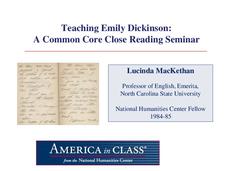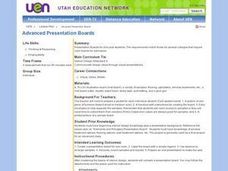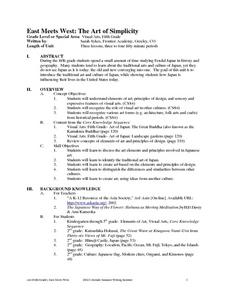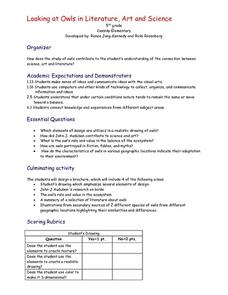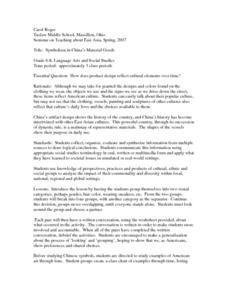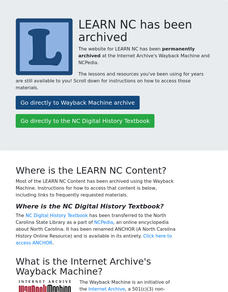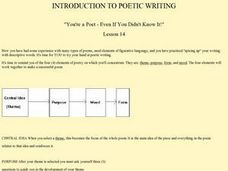Bantam Books
The Tempest: Think-Aloud Annotation
It can be difficult to refer back to a text when analyzing it, so annotation is a great tool for kids to track what they are reading. A thorough and well-organized activity guides learners through the process of annotating William...
Fluence Learning
Writing Informative Text: Did Shakespeare Write Shakespeare?
William Shakespeare penned some of the richest and most fascinating works of literature—or did he? Middle schoolers read three brief informative passages and conduct additional research to evaluate the claim that Shakespeare did not...
K20 LEARN
Lord of the Flies Unit, Lesson 3: Behind the Mask
After watching a video about masks from many cultures, class members research the history of masks and build a Driving Question Board. Individuals then create a mask for a character from The Lord of the Flies, justifying elements of...
National Gallery of Canada
Self-Portrait, Mirrors and Metamorphosis!
Using M.C. Escher's Hand with Reflecting Sphere as inspiration, learners create their own set of self-portraits using various reflective surfaces. The lesson begins with a discussion about portraiture and ends with a presentation of work...
Penguin Books
The Curriculum Guide for The Secret Hum of a Daisy by Tracy Holczer
The death of a parent can turn a child's world upside down. A curriculum guide for The Secret Hum of a Daisy explores defining moments in the main character's life, including the loss of her mother. Chapter-by-chapter discussion...
Curated OER
Civil War Literature Circle
Historical fiction can be a valuable asset when learning about the past. Integrate several novels written about the Civil War into your social studies unit, with groups of four working collaboratively to comprehend the novel from...
Media Smarts
Looking at Newspapers: Introduction
A scavenger hunt introduces class groups to the different sections of newspapers and the different types of articles found in each section.
Curated OER
Ethos, Logos, and Pathos in Civil Rights Movement Speeches
Examine three speeches while teaching Aristotle's appeals. Over the course of three days, class members fill out a graphic organizer about ethos, pathos, and logos, complete an anticipatory guide, read speeches by Martin Luther King Jr.,...
National Humanities Center
Teaching Emily Dickinson: A Common Core Close Reading Seminar
Three of Emily Dickinson's poems, "I like to see it," "Because I could not stop for Death," and "We grow accustomed to the Dark," provide instructors with an opportunity to model for class members how to use close reading strategies to...
Annenberg Foundation
Gothic Undercurrents
Terror, mystery, excitement. American writers of the 19th century, including Nathaniel Hawthorne, Herman Melville, and Emily Dickinson, used these elements to create morally ambiguous tales that challenged the prevailing belief in...
Curated OER
Advanced Presentation Boards
Learners are introduced to the proper way to make presentation boards. Individually, they use the elements of design to make a presentation board for one room and create a legend. To end the lesson, they present their boards to the class.
Curated OER
East Meets West: The Art of Simplicity
Fifth graders examine the influences of Japan on American life through this three lesson unit. Feudal Japan with its traditional arts and culture is contrasted with current developments of the country.
Curated OER
Looking at Owls in Literature, Art, and Science
Fifth graders investigate the characteristics of owls through various science and art activities. They analyze drawings by J.J. Audubon and complete a Venn diagram comparing the similarities and differences of different kinds of owls,...
Curated OER
Creating a Comic Strip
Students examine various comic strips for their elements of humour, plot, drawing style, and basic design; they then create their own comic strip.
Curated OER
Arcimboldo Style Self Portraits
Students view and discuss Renaissance art, including the work of Arcimboldo. They create their own self portraits through imagery and symbolism in the Arcimboldo style.
Curated OER
Exploring Photographs: Methods of Visual Analysis
Students use the methods of description, reflection, and formal analysis for a study of images. In this image analysis activity, students work in teams to interpret and analyze an assigned work of art. Students write responses to the...
Curated OER
Line Up! Shape Up! Color the World!
Students explore the Elements of Art. In this art lesson, students read the book Katie Meets the Impressionists and brainstorm the different things that artists create. Students observe various elements of art such as line and color and...
Curated OER
Symbolism in China's Material Goods
Students make a generalization about the process of 'looking' and 'grouping', hoping to show that we, as Americans, show preferences and shared choices. They study examples of American art through time and create a class chart...
Curated OER
"Three Cool Kids"
First graders discuss literary elements: characters, setting, problem and solution, after reading Three Cool Kids by Rebecca Emberley. The teacher records what students say using Inspiration, making a web that shows the different...
Curated OER
Pick It Up!
Students investigate recycling by creating receptacles that can hold trash or recyclable items. In this graphic design lesson plan, students encourage their classmates to help save the environment by using a recycling receptacle they...
Curated OER
Coast-to-Coast Book Design-Part 4: Let's Create the Pages!
Pupils work in groups to share their lists of A-B-C ideas they came up with from the previous activity. They review page layouts taught during lesson two. Students complete a rough draft of their page. They create a colored illustration...
Curated OER
Students Get Animated: Make Existing Lessons Move and Motivate Students
Students study the chemical elements in a computer generated cartoon format. In this computer animation and chemistry lesson, students learn how to animate using computer programs. Students use animation to learn about the Periodic Table...
Curated OER
Learning Plot
Tenth graders identify certain literary elements such as conflict, and exposition within the text of a variety of studenT books. Aspects of literary elements such as theme, and allusion are explored in this lesson.
Curated OER
INTRODUCTION TO POETIC WRITING
Learners read about the four elements of poetry: form, theme, purpose, and mood. They are given several questions to ask themselves about each element as they begin to write their own successful poems.










